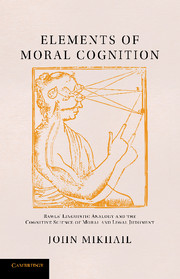 Elements of Moral Cognition
Elements of Moral Cognition Book contents
- Frontmatter
- Contents
- List of Tables and Figures
- Preface
- PART ONE THEORY
- PART TWO EMPIRICAL ADEQUACY
- PART THREE OBJECTIONS AND REPLIES
- 7 R. M. Hare, Peter Singer, and the Distinction between Empirical and Normative Adequacy
- 8 Thomas Nagel and the Competence–Performance Distinction
- 9 Ronald Dworkin and the Distinction between I-Morality and E-Morality
- PART FOUR CONCLUSION
- Appendix: Six Trolley Problem Experiments
- Bibliography
- Index
9 - Ronald Dworkin and the Distinction between I-Morality and E-Morality
Published online by Cambridge University Press: 07 September 2011
- Frontmatter
- Contents
- List of Tables and Figures
- Preface
- PART ONE THEORY
- PART TWO EMPIRICAL ADEQUACY
- PART THREE OBJECTIONS AND REPLIES
- 7 R. M. Hare, Peter Singer, and the Distinction between Empirical and Normative Adequacy
- 8 Thomas Nagel and the Competence–Performance Distinction
- 9 Ronald Dworkin and the Distinction between I-Morality and E-Morality
- PART FOUR CONCLUSION
- Appendix: Six Trolley Problem Experiments
- Bibliography
- Index
Summary
The common saying that the law is known by nature should not be understood … as though actual and distinct propositions concerning things to be done or to be avoided were inherent in men's minds at the hour of their birth. But it means in part … that at least the common and important provisions of the natural law are so plain and clear that they at once find assent, and grow up in our minds, so that they can never again be destroyed, no matter how the impious man, in order to still the twinges of conscience, may endeavor to blot out the consciousness of those precepts. For this reason … the law is said to be “written in the hearts” of men. Hence, since we are imbued from childhood with a consciousness of these maxims, in accordance with our social training, and cannot remember the time when we first imbibed them, we think of this knowledge exactly as if we had it already at birth. Everyone has the same experience with his mother tongue.
– Samuel Pufendorf, On the Duty of Man and CitizenRonald Dworkin is one of the few early commentators on A Theory of Justice who display any enthusiasm for Rawls' linguistic analogy. In his 1973 essay, “The Original Position,” later reprinted as Chapter 6 of his influential book Taking Rights Seriously (1977), Dworkin refers at one point to “Rawls' exciting, if imprecise, idea” that the conditions embodied in the original position are “constitutive of our moral capacity.”
- Type
- Chapter
- Information
- Elements of Moral CognitionRawls' Linguistic Analogy and the Cognitive Science of Moral and Legal Judgment, pp. 266 - 304Publisher: Cambridge University PressPrint publication year: 2011


